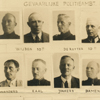Jodenvervolging en daderprocessen in België en Nederland (1944-1951): rechtspraak en herinneringsculturen
DOI:
https://doi.org/10.18352/bmgn-lchr.10207Keywords:
Belgium, Netherlands, History, Second World War, Jews,Abstract
In the aftermath of the Second World War, a number of ‘didactic trials’ against perpetrators of the Holocaust heavily influenced historiography, the construction of memory and historical thinking. The influence of small scale, serial trials immediately following the war is much harder to detect. In this article, we compare post war trials against Dutch and Belgian policemen, denouncers and concentration camp guards between 1944 and 1951. Both countries lacked specific ‘trial narratives’ with regard to local perpetrators in the Holocaust. Legal procedures against them thus closed off this part of the past. The trials were a legal confirmation of the existing consensus to deny the full responsibility of local perpetrators, a situation which persisted in Belgium for decades. In the Netherlands, however, the ‘closed off’ past resurfaced when ‘memory incidents’ came up in the 1950s. The notion of local perpetrators in the Holocaust was linked to a wave of more general social criticism during the 1960s.
In de nasleep van de Tweede Wereldoorlog hadden sommige in het oog springende ‘didactische rechtszaken’ tegen daders van de Jodenvervolging een grote invloed op de geschiedschrijving, de herinneringsconstructie en het historische bewustzijn. De invloed van kleinere seriële processen onmiddellijk na de Tweede Wereldoorlog is veel moeilijker te bepalen. In dit artikel vergelijken we naoorlogse rechtszaken tegen Nederlandse en Belgische politiemensen en geüniformeerde wapendragers, verklikkers en kampbewakers tussen 1944 en 1951. In beide landen ontstonden om diverse redenen geen specifieke ‘procesnarratieven’ rond het daderschap van Belgische en Nederlandse Jodenvervolgers. De gerechtelijke procedures in beide landen sloten zo dit stuk verleden af. Deze processen vormden een juridische bekrachtiging van een bestaande consensus om de volle eigen verantwoordelijkheid niet onder ogen te zien. In België bleef deze situatie lange tijd bestaan. In Nederland werd dit ‘gesloten verleden’ toch snel weer opengebroken. Dit laatste gebeurde (onder meer) van onder uit. Het vermeende falen van de Bijzondere Rechtspleging in sommige zaken leidde al in de jaren 1950 tot herinneringsincidenten. Op die manier kon het eigen daderschap in de Jodenvervolging sneller aansluiting vinden bij de bredere golf van maatschappijkritiek in de jaren 1960.
Downloads

Published
Issue
Section
License
Authors who publish with this journal agree to the following terms:
a) Authors retain copyright and grant the journal right of first publication with the work simultaneously licensed under a Creative Commons Attribution 4.0 International (CC BY 4.0) that allows others to share the work with an acknowledgement of the work's authorship and initial publication in this journal.
b) Authors are able to enter into separate, additional contractual arrangements for the non-exclusive distribution of the journal's published version of the work (e.g., post it to an institutional repository or publish it in a book), with an acknowledgement of its initial publication in this journal.
c) Authors are permitted to post their work online (e.g., in institutional repositories or on their website) prior to and during the submission process.
Authors are explicitly encouraged to deposit their published article in their institutional repository.








